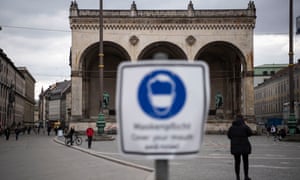GDP in the 19 economies sharing the euro shrank by 0.6% between January and March

The eurozone fell back into recession in the first three months of the year, as a slow vaccination drive and tougher restrictions to stem a third coronavirus wave damaged the region’s economies.
GDP in the 19 economies sharing the euro shrank by 0.6% between January and March compared with the previous quarter, according to figures from Eurostat, the EU’s statistical office.
The decline came after a 0.7% drop in the fourth quarter of 2020, when the strong rebound seen over the summer – with third-quarter growth of 12.5% – faded as a new wave of Covid-19 hit Europe.
This means that the eurozone is in a technical recession, defined as two consecutive quarters of economic contraction, for the second time since the pandemic began, a so-called double dip recession. The UK has not reported first-quarter GDP yet; it shrank in January but grew in February. The US has posted a rise of 1.6% while China recorded 0.6% growth.
Three of the eurozone’s largest economies were in decline. The main negative surprise came from Germany, which shrank by 1.7%, while Spain contracted by 0.5% and Italy’s GDP fell by 0.4% – which put the Italian economy into a technical recession. France grew 0.4%, having delayed its lockdown until the end of March when a surge in infections forced president Emmanuel Macron to act.
Things are starting to look brighter: economists are expecting the eurozone to bounce back in the current quarter, as Covid vaccinations have picked up.
The EU has also approved a €750m (£653m) rescue package dubbed NextGenerationEU to help repair the immediate economic and social damage wrought by the pandemic. Coupled with the EU’s long-term budget, it will be the EU’s largest stimulus package to date, a total of €1.8tn to rebuild a post-Covid Europe.
Maddalena Martini, a Milan-based economist for Oxford Economics, said: “We see the economy posting decent growth in the second quarter, before rebounding even more strongly in the second half.
“Indeed, the gradual removal of restrictions across the economies and herd immunity reached by the summer will boost the eurozone recovery. Moreover, incoming NGEU funds will start playing a major role in the recovery profile in some countries.”
The wider EU of 27 countries also went into recession in the first quarter when GDP fell by 0.4%, following a 0.5% contraction in the previous quarter.
Rolling coverage of the latest economic and financial news
